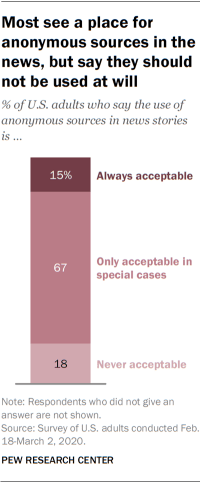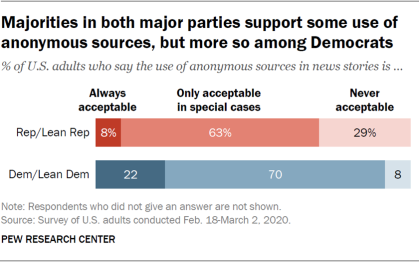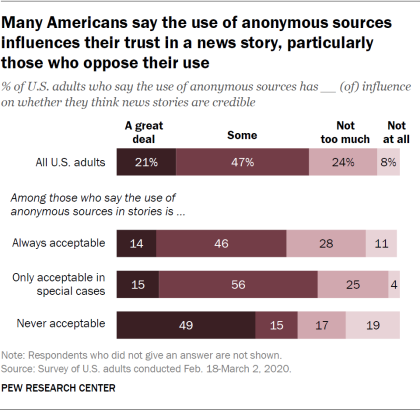In recent years there has been renewed interest in the debate over journalists’ use of anonymous sources, and this has included criticism directly from President Donald Trump. Survey data from earlier this year shows that most Americans see a place for journalists to use anonymous sources, but few think journalists should have carte blanche to use them when reporting the news.
A majority of U.S. adults (82%) say that there are times when it is acceptable for journalists to use anonymous sources, with 67% saying it is acceptable only in special cases – a view which echoes the standards of professional journalism organizations that say journalists should take every step to attribute information to a named source when possible before relying on an anonymous source. A much smaller share – 15% – thinks use of anonymous sources is always acceptable. About two-in-ten Americans (18%) think it is never acceptable.
These findings come from a Pew Research Center survey conducted Feb. 18 to March 2, 2020, around the time that there was continued interest and debate about the anonymous author who penned a 2018 New York Times op-ed and a subsequent book in 2019 that criticized Trump and who claimed to be an administration official.
To examine Americans’ attitudes of anonymous sources, we surveyed 10,300 U.S. adults between Feb. 18 to March 2, 2020. Everyone who completed the survey is a member of Pew Research Center’s American Trends Panel (ATP), an online survey panel that is recruited through national, random sampling of residential addresses. Recruiting our panelists by phone or mail ensures that nearly all U.S. adults have a chance of selection. This gives us confidence that any sample can represent the whole population (see our Methods 101 explainer on random sampling). To further ensure that each survey reflects a balanced cross section of the nation, the data is weighted to match the U.S. adult population by gender, race, ethnicity, partisan affiliation, education and other categories. Read more about the ATP’s methodology.
See here to read more about the questions and responses used for this post and the methodology.
Visit our interactive data tool to access the questions included in this post, as well as other data on Americans’ attitudes toward the news media.
This analysis was made possible by The Pew Charitable Trusts, which received support from the John S. and James L. Knight Foundation.
The public’s approval of anonymous sourcing, then, depends heavily on why these sources are being used. But news organizations may not be making this entirely clear. Fewer than half of Americans (42%) say that news outlets do very or somewhat well in telling their audiences how they choose or find sources, according to a recent Pew Research Center report.
Democrats are somewhat more likely than Republicans to express support for journalists’ use of anonymous sources, though majorities of both parties think they are acceptable, at least in moderation. Roughly nine-in-ten Democrats and Democratic-leaning independents (92%) say that it is acceptable for journalists to use anonymous sources, as do about seven-in-ten Republicans and Republican leaners (71%). But like Americans overall, most in each party say anonymous sources should be used only in special cases.
While fewer in each party say it is always acceptable to rely on anonymous sources, Democrats are about three times as likely as Republicans to say this (22% vs. 8%). The relationship is nearly the inverse for the feeling that anonymous sources should be forbidden. Nearly three-in-ten Republicans (29%) think that it is never acceptable to use anonymous sources – 21 percentage points higher than Democrats who say the same (8%).
This divide between the two parties comes as gaps have also emerged in their views of the ethical standards of journalists. A Pew Research Center study from May found that only about one-in-five Republicans (19%) say journalists have either high or very high ethical standards, far lower than the 64% of Democrats who say the same.
While most Americans express some support for the use of anonymous sources, a sizable portion of the public also says that journalists’ use of anonymous sources influences whether they trust a news story. This sense is particularly strong among those who think anonymous sources should be forbidden in all cases.
Nearly seven-in-ten Americans (68%) say that an anonymous source in a story has at least some influence on whether they find that story credible (21% say a great deal of influence and 47% say some influence). About three-in-ten (31%) say it has not too much influence or no influence at all. And while majorities of both Democrats and Republicans say anonymous sources have at least some influence in deciding whether to trust a story, Republicans are much more likely to say it has a great deal of influence: 31% vs. 13%.
Those who say it is never acceptable to use an anonymous source are roughly three times as likely to say it has a great deal of influence on whether they think a story is credible (49% vs. 15% of those who say it is acceptable in special cases and 14% of those who say always acceptable). Still, majorities of all three groups say that an anonymous source has at least some influence on their trust in a story.
For a look at this data among a range of demographic groups, see our interactive tool.
Note: Here are the questions and responses used for this analysis, along with responses, and its methodology.






